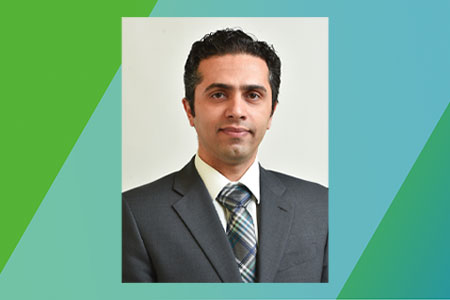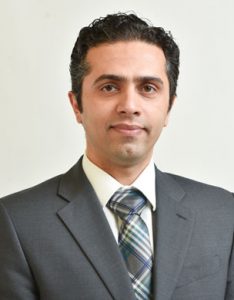OICR’s new Early Career Investigator is harnessing the gut microbiome’s immunogenic properties to improve cancer patients’ response to immunotherapy.
To make progress against a disease as complex as cancer, Dr. Saman Maleki thinks it’s important to consider unconventional approaches. His groundbreaking research combines his backgrounds in immunology and microbiology with a passion for translational research that makes a difference for people with cancer.
Maleki’s work at Western University and the Lawson Health Research Institute focuses on novel approaches to sensitize tumours to immunotherapy, and he helped pioneer the use of fecal microbiota transplantation (FMT) to strengthen cancer patients’ immune systems.
Now, as OICR’s newest Early Career Investigator, he aims to move his research forward to open up new therapeutic options against other hard-to-treat cancers such as pancreatic cancer.
OICR News recently spoke to Maleki about his research, his motivation and his hopes for the future of oncology.
Tell us about your research interests and your approach to your work.
I’ve always been interested in translational cancer research and what happens to our research after it leaves the lab. As scientists, we want our work to have an impact on patients. But I’ve learned that doesn’t happen easily.
As a PhD scientist, I was determined to help bridge the gap between basic science and the clinic. So, I spent a lot of time with medical oncologists and other clinicians, speaking to them and going to see patients with them. That helped expose me to what happens in the clinic, and I started identifying areas where basic science could help address some of their concerns. The time I spent in the clinic also reinforced the importance of coming up with innovations that can open new lines of treatment for patients.
Immunotherapy is an exciting new class of cancer treatment. Tell us about your research into the microbiome and what it could mean for immunotherapy.
The gut microbiome is the bacteria and other bugs that live in your gut, and research has shown there is a very close relationship between the gut microbiome and the development of the immune system. The two systems are always interacting, both in health and in disease.
Looking at the literature, it seemed that when certain features in the microbiome were present in a patient, they tended to respond better to immunotherapy drugs called checkpoint inhibitors.
The beauty of the microbiome is that is a malleable organ. You can change the microbiome through procedures like FMT, where stool and the bacteria within it are transplanted from one person to another. So, I thought: why don’t we try using FMT to change cancer patients’ microbiome before they have immunotherapy and see if we can improve their response?
You were among the first researchers to propose using FMT in cancer patients. What was the reaction from the oncology community?
We started designing our first trial back in 2016, and there was not much interest in the microbiome back then. There were hints in the literature that the microbiome could be used as a therapeutic modulation strategy for cancer but I’m not sure the field was ready for it at the time. It was considered very ‘outside the box’ and I even had oncologists walk away from me when I was explaining the idea.
But I was convinced that we could replace a cancer patient’s microbiome with a healthy microbiome and potentially improve their response to immunotherapy. And there were some brave oncologists who went over the literature and the theory behind it with me and became interested. After a huge amount of effort by many people, we gradually built a program of prospective clinical trials where we performed FMT in cancer patients before they had immunotherapies.
Through these trials, we’re now providing a new treatment in cancer patients that wasn’t there before, and not a day goes by where I don’t get a call from someone interested in our work.
What is the status of these trials and what have you found so far?
Our first trial was in advanced melanoma patients at London Health Sciences Center in London and two other hospitals in Montreal (CHUM and JGH), and it was recently featured in an article in Nature. Of the 20 people we enrolled, 65 per cent had either a partial or complete response to immunotherapy after having FMT. Though it is preliminary, the data we collected was remarkable and we are very encouraged by the safety signal.
Using what we learned from that melanoma trial, we built other trials using FMT before immunotherapy in renal and lung cancer patients, and we are just starting the process of setting up a trial in pancreatic cancer.
What are the biggest questions remaining about the microbiome and immunotherapy?
I think we still have a lot to learn about the functionality of the microbiome, and about the ideal composition of the microbiome to improve response to immunotherapy. That’s tricky because everyone’s microbiome is different, and the ideal composition for a melanoma patient might be different than for a lung cancer patient.
We also need to determine the best approaches to target the microbiome. The transplant we are doing is sort of the ‘nuclear option’ where you get the entire gut microbiome from someone and put it in a new person. But there could be more targeted options that better meet an individual patient’s needs. More research is required to understand which patient would need a more robust change in their gut microbiome or a more targeted approach.
Where do you see this work going in the future?
Oncology is shifting and we are entering a new era where we are focused more on treating the patient instead of treating their tumour.
Immunotherapies will help define this new era, but at the moment, a large proportion of people are resistant to them. Our work is a proof of principle that you can safely target the microbiome with the goal of improving immunity and ultimately increasing response to immunotherapies.
With the knowledge we’ve gained, I can foresee a future where we profile a patient’s microbiome for deficiencies the same way we profile mutations in cancer looking for druggable mutations. Then, based on the signatures we find, we can build microbiome approaches on top of the other available treatment options.
That is truly personalized medicine, and it gives us one more approach to bring to the table against cancer.


